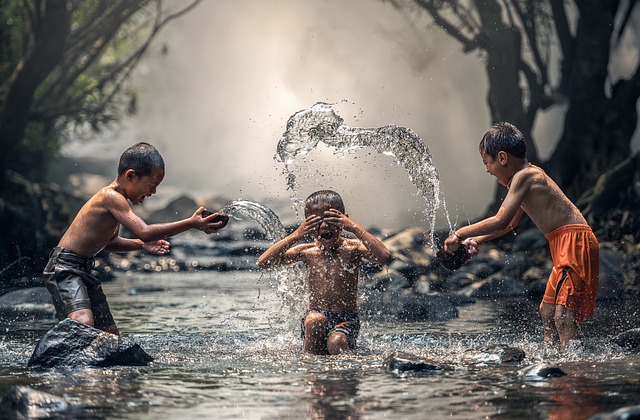By Scott Denning, Colorado State University | –
My parents said the planet is getting too hot for people to live here. They called it climate change. What does that mean? – Joseph, age 12, Boise, Idaho
Many countries have seen extremely hot weather lately, but in most of the inhabited world, it’s never going to get “too hot for people to live here,” especially in relatively dry climates.
When it’s hot outside in dry places, most of the time our bodies can cool off by evaporating water and heat from our skin as sweat.
However, there are places where it occasionally gets dangerously hot and humid, especially where hot deserts are right next to the warm ocean. When the air is humid, sweat doesn’t evaporate as quickly, so sweating doesn’t cool us the way it does in drier environments.
In parts of the Middle East, Pakistan and India, summer heat waves can combine with humid air that blows in off the sea, and this combination can be truly deadly. Hundreds of millions of people live in those regions, most without access to indoor air conditioning.

Image by Sasin Tipchai from Pixabay
Scientists like me use a “wet bulb thermometer” to get a better sense of this risk. A wet bulb thermometer allows water to evaporate by blowing ambient air over a damp cloth. If the wet bulb temperature is over 95 F (35 C), and even at lower levels, the human body won’t be able to let enough heat out. Prolonged exposure to such combined heat and humidity can be fatal.
During a severe heat wave in 2023, wet bulb temperatures were very high over the lower Mississippi Valley, though they didn’t reach fatal levels. In Delhi, India, where air temperatures were over 120 degree Fahrenheit (49 Celsius) for several days in May 2024, the wet bulb temperatures came close, and several people died from suspected heatstroke in the hot and humid weather. In conditions like that, everyone has to take precautions.
Is it climate change?
When people burn carbon – whether it’s coal in a power plant or gasoline in a vehicle – it creates carbon dioxide (CO2). This invisible gas builds up in the atmosphere and traps the Sun’s warmth near the Earth’s surface.
The result is what we mean by “climate change.”
Every bit of coal, oil or gas that ever gets burned adds a little bit more to the temperature. As temperatures rise, dangerously hot and humid weather has begun to spread to more places.
Areas of the U.S. Gulf Coast in Louisiana and Texas are increasingly at risk of dangerous hot and humid conditions in summer, as are heavily irrigated areas of the desert Southwest where water sprayed over farm fields adds moisture to the atmosphere.
Climate change causes a lot more problems than just hot, sweaty weather.
Hot air evaporates a lot more water, so crops, forests and landscapes in some areas dry out, which makes them more susceptible to wildfire. Each Celsius degree of warming can cause a sixfold increase in wildfire over parts of the western U.S.
Warming also makes ocean water expand, which can flood coastal regions. Rising sea levels threaten to displace as many as 2 billion people by 2100.
All of these impacts mean that climate change threatens the global economy. Continuing to burn coal, oil and gas could cut global incomes by about 25% by the end of the century, according to one estimate.
Good news and bad news
There’s both bad news and good news about climate change in the future.
The bad news is that as long as we keep burning carbon, it will continue to get hotter and hotter.
The good news is that we can substitute clean energy, like solar and wind power, instead of burning carbon, to power the products and services of modern life.
There’s been tremendous progress in the past 15 years in making clean energy reliable and affordable, and almost every country on Earth has now agreed to stop climate change before too much damage is done.
Just as our ancestors built better lives by switching from outhouses to indoor plumbing, we will avoid making our world unlivable by switching from coal, oil and gas to clean energy.
Hello, curious kids! Do you have a question you’d like an expert to answer? Ask an adult to send your question to CuriousKidsUS@theconversation.com. Please tell us your name, age and the city where you live.
And since curiosity has no age limit – adults, let us know what you’re wondering, too. We won’t be able to answer every question, but we will do our best.![]()
Scott Denning, Professor of Atmospheric Science, Colorado State University
Curious Kids is a series for children of all ages. If you have a question you’d like an expert to answer, send it to curiouskidsus@theconversation.com.

This article is republished from The Conversation under a Creative Commons license. Read the original article.



 © 2026 All Rights Reserved
© 2026 All Rights Reserved